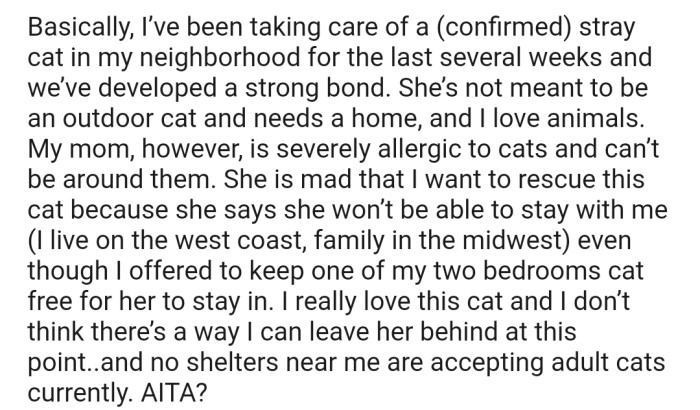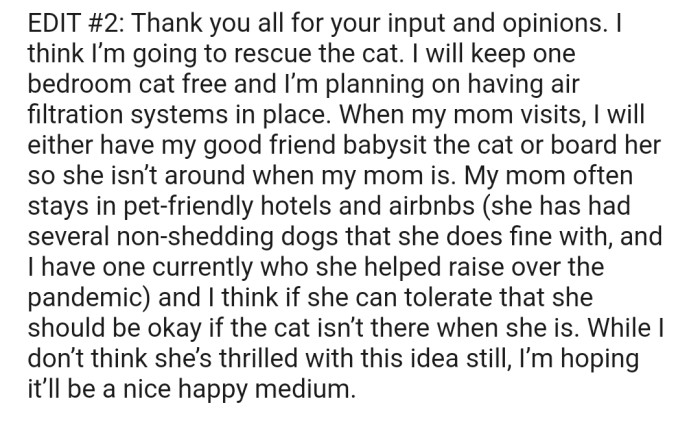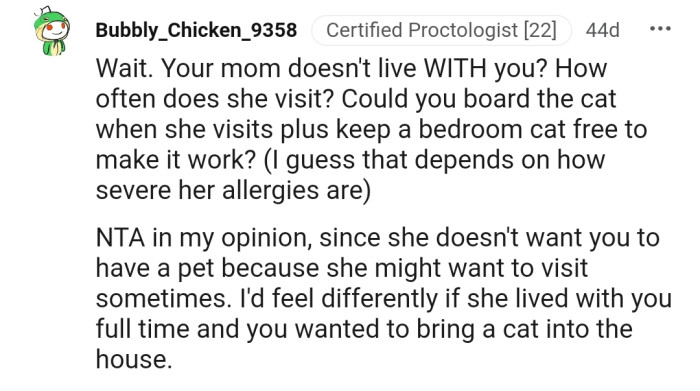Redditor Wonders If They Were Wrong To Rescue Stray Cat Despite Their Mom’s Severe Cat Allergy That Could Prevent Her From Visiting
Cats are one of the world’s top choices for pets. These felines have a unique way of worming their way into a person’s heart.
For example, the numerous benefits they offer, including an increase in serotonin levels, a reduction in stress, and generally healthier well-being, make them an irresistible choice for pet lovers.
Despite these benefits, millions of cats are homeless, and this number does not include wild cats.
Thankfully, many people cannot stand to see a homeless cat. They take them in, care for them, and easily fall in love with them.
We found one story on the AITA subreddit that paints a similar picture.
OP shared with the community that they had developed a strong bond with a stray cat after caring for it for weeks.
Unfortunately, OP’s mother is allergic to cats and is upset that OP wants to rescue the cat, as it would prevent her from being able to visit OP.
Although OP assured her that they would keep two bedrooms cat-free so she could visit, this assurance did nothing to ease OP’s mother’s anger. This left OP in an awkward position, as they love the cat and cannot leave her since no shelters around them accept adult cats.
OP then asked the community the AITA question. Scroll down to see what they thought!
Let's dig into the details

OP has been taking care of a stray cat for some time now. The problem is, their mom is allergic to cats and won't be able to visit OP if they decide to keep the stray cat

First edit

The Emotional Weight of Rescuing Animals
Rescuing a stray cat often brings forth a complex mix of emotions, including compassion and guilt.
Research in animal welfare psychology indicates that individuals may experience moral dilemmas when their actions conflict with the needs of family members, as seen with the mother's cat allergy.
This highlights the importance of balancing personal values with practical considerations.
The Emotional Implications of Rescuing Strays
Rescuing a stray cat, despite family allergies, illustrates the deep emotional connections individuals can form with animals. According to research in the field of human-animal interactions, pets often fulfill emotional needs and provide companionship, which can outweigh practical considerations.
This decision highlights the complexities of attachment and the lengths individuals may go to protect vulnerable beings.
The Psychological Impact of Pet Ownership
Dr. Rachel Adams, a psychologist at the University of Virginia, discusses the emotional complexities of pet ownership, particularly when it involves allergies or other health concerns.
When a person rescues a stray cat, it often reflects a strong emotional connection to animals, which can sometimes conflict with the needs of other family members, such as allergies.
This situation illustrates the need to balance personal desires with family health considerations.
Edit 2

Here's how the Reddit community reacted to the story:
"NTA...I'd feel differently if she lived with you full time and you wanted to bring a cat into the house."

"Your home, your pet."

From a psychological perspective, the decision to rescue an animal can evoke feelings of responsibility and attachment.
Studies show that when individuals form bonds with animals, they may prioritize their needs over personal challenges, leading to internal conflict.
This situation illustrates how love for animals can sometimes clash with family dynamics.
However, this situation raises important questions about the impact of allergies on family dynamics. Research shows that allergies can create significant stress within households, particularly when family members have different needs and priorities.
Understanding these dynamics is crucial for navigating conflicts that arise from such decisions.
Research published in the Journal of Personality and Social Psychology suggests that pet ownership can significantly enhance emotional well-being but may also lead to interpersonal conflicts when health issues arise.
In this case, the Redditor's decision to rescue the cat could lead to tension within the family, highlighting the importance of understanding different perspectives and health considerations.
Recognizing these dynamics can foster empathy and collaboration among family members.
"You can visit her instead or, like you said, the cat-free room or help put her up in a nice hotel."

"NTA. Live your life; let other people adjust."

"You’re not the AH. If it bothers her that much, she can stay at an Airbnb, at a different family member's place, or at a nearby hotel."

Navigating Family Dynamics and Allergies
Allergies can complicate family dynamics, particularly when they involve beloved pets.
Research indicates that family members often need to negotiate their needs when it comes to shared living spaces, especially regarding health concerns.
In this case, finding a solution that respects both the cat's well-being and the mother's health is essential.
Balancing Love for Animals and Family Needs
Finding a balance between a love for animals and the needs of family members is vital. Experts recommend engaging in open discussions about the implications of pet ownership, particularly when allergies are involved.
Research published in the Journal of Allergy and Clinical Immunology highlights the importance of addressing health considerations while recognizing emotional attachments.
Navigating Conflicts Arising from Health Concerns
Effective communication is key when addressing health concerns related to pets.
Experts recommend that family members openly discuss their feelings and any potential health risks associated with pet ownership.
Using 'I' statements can help express concerns without placing blame, promoting a more constructive dialogue.
"Your house, and you deserve to get a cat if you want to."

"NTA, your mom doesn’t need to stay with you. She can get a hotel, and you can meet outside the home when she comes to visit."

"You can get a cat if you want one, but you should also be able to acknowledge that this could be hurtful to your mum."

Moreover, it may be helpful to explore alternative solutions, such as creating cat-free zones in the home or considering temporary care options.
Behavioral specialists recommend these strategies to help family members coexist peacefully while managing allergies.
Such compromises can foster understanding and reduce tension.
Additionally, exploring alternative solutions, such as creating allergy-friendly spaces or considering hypoallergenic pet options, can help mitigate conflicts. This collaborative approach can foster understanding and respect for each family member's needs.
Ultimately, open communication about individual preferences and health concerns is essential in finding a resolution that honors both the animal's needs and family well-being.
Additionally, engaging in active listening can enhance understanding between family members.
Research indicates that families who practice active listening are better equipped to resolve conflicts and strengthen their emotional bonds.
This technique involves summarizing what the other person has said and responding with empathy, creating a safe space for everyone to express their feelings.
Many commenters believe OP is NTA since their mother doesn’t live with them.
However, another group of people believes the verdict should be NAH, as neither OP nor their mother can be regarded as AHs since both have valid points.
According to them, OP is allowed to have a cat, but they should also accept that keeping the cat may prevent their mother from visiting due to her allergy.
Do you agree with the commenters? Let us know in the comments below!
Finding Compromise and Building Trust
To mitigate conflicts surrounding pet ownership, families are encouraged to seek compromises that respect everyone's needs.
Establishing a plan for pet care that considers health concerns can foster collaboration and reduce tension.
Studies show that when families work together toward a common goal, it strengthens their bond and builds trust.
Moreover, exploring the emotional significance of the pet can lead to deeper insights for all family members.
Understanding why the pet is important to each individual can foster empathy and compassion, allowing for more collaborative decision-making.
Research shows that acknowledging each other's feelings can enhance family satisfaction and emotional intimacy.
Seeking Professional Guidance When Needed
If conflicts persist, seeking professional help can provide valuable support for families.
Therapists can facilitate discussions and help family members navigate their emotional responses to create more productive conversations.
Research indicates that professional guidance can improve communication skills and strengthen family dynamics.
Additionally, engaging with educational resources about pet ownership and health considerations can empower families with knowledge and strategies.
Workshops, books, and online courses can provide practical insights that support healthy relationships and responsible pet ownership.
Investing time in learning can transform challenges into opportunities for growth and connection.
Psychological Analysis
This situation highlights the emotional complexities that arise when rescuing pets in the face of health concerns. Understanding the perspectives of all family members can help foster empathy and encourage collaborative solutions.
Analysis generated by AI
Analysis & Alternative Approaches
In conclusion, navigating the challenges of pet ownership requires effective communication and an understanding of emotional needs.
According to Dr. John Gottman, a renowned marriage researcher, "Healthy relationships are built on open dialogue and the ability to compromise." This approach is essential for maintaining healthy family dynamics.
By implementing these strategies, families can work together to create a harmonious living environment that respects both human and animal needs.
The Role of Empathy in Family Decisions
Empathy plays a critical role in navigating family decisions about pets. According to relational psychologists, understanding each family member's perspective can lead to more compassionate and constructive resolutions.
Fostering a culture of empathy can help family members express their needs and feelings openly, reducing the likelihood of conflicts arising.
Encouraging family meetings to discuss pet-related decisions can create a supportive environment where everyone feels heard. Research indicates that families who engage in open dialogue experience lower levels of conflict and higher overall satisfaction.
By addressing each member's concerns, families can work together to build a harmonious living situation.
Psychological Analysis
This situation underscores the tensions that can arise when personal desires clash with family health considerations. Encouraging open communication and empathy can help families navigate these complexities while honoring both emotional attachments and health needs.
Analysis generated by AI
Analysis & Alternative Approaches
In conclusion, navigating the complexities of rescuing a stray cat amidst family allergies requires empathy and open communication. By fostering discussions about individual needs and exploring alternative solutions, families can create a supportive environment that honors both human and animal welfare.
Ultimately, balancing love for animals with family health considerations is key to achieving harmony.
Practical Steps for Communication and Compromise
To address this situation, open communication is key.
Engaging in family discussions about the cat and allergies can help identify shared concerns and preferences.
Furthermore, involving a neutral third party, like a family counselor, can facilitate these conversations and promote understanding.
Psychological Analysis
This situation highlights the often conflicting emotions that arise when family dynamics intersect with animal welfare.
Recognizing and addressing these tensions through open dialogue can foster healthier relationships and solutions.
Analysis generated by AI
Analysis & Alternative Approaches
In conclusion, navigating the emotional landscape of rescuing animals requires sensitivity to family dynamics and health concerns.
By fostering communication and exploring creative solutions, families can find ways to honor both their love for animals and each other's needs.



